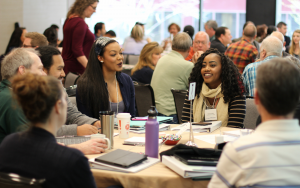For far too long and for far too many, particularly Black, Latinx, and Indigenous students, and students impacted by poverty, the traditional developmental math system has been a barrier to college completion, perpetuating inequalities in degree attainment and income. Since 2010, Carnegie Math Pathways has been committed to transforming this system of math teaching and learning in order to make math a gateway to success for ALL students.
In our latest Carnegie Math Pathways report, Moving Mathematical Mountains: A Decade of Educator-Led Change to Make Math a Gateway to Success for All Students, we show that changing the status-quo approach to math education is not only possible, but imperative to helping students not just pass college math but thrive academically, professionally, and personally.
Working alongside educators for over a decade we’ve helped instructors, administrators, and institutions implement more equitable math learning by:
- introducing math pathways aligned with majors, relevant to students’ lives, and to 21st century career paths;
- engaging all students directly in college-level math, with the supports they need to be successful;
- creating an active, collaborative learning experience centered on relatable and meaningful contexts;
- attending to the needs of the whole learner through embedded social emotional learning supports that address key non-cognitive factors, such as growth mindset and belonging; and
- supporting faculty and administrative leaders in transforming the student experience through rich professional learning and peer support.
Moving Mathematical Mountains highlights the power of an educator-driven network and the impact of our community’s efforts through 10 years of outcome data, as well as student, faculty, and institutional feature stories. It synthesizes our learnings about what it takes to create and sustain equitable math reform and sets the stage for the exciting possibilities for the decade ahead. It shows us the potential of making lasting and impactful change in the service of students, something we as a field can learn from and continue to advance collectively to ensure more equitable learning and success in mathematics.
